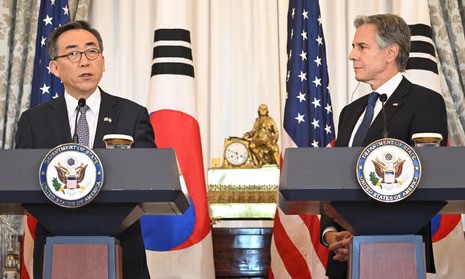The U.S. government is sounding alarms as thousands of North Korean soldiers gear up to join Russia’s conflict against Ukraine. According to U.S. Secretary of State Antony Blinken, approximately 8,000 North Korean soldiers will begin combat operations in the Kursk region “in the coming days.”
Rising Tensions in Kursk

Blinken revealed that of the 10,000 North Korean troops sent to Russia for training, a staggering 80% are now stationed in Kursk. The region, which has seen relentless fighting since Ukraine’s offensive in August, remains a critical and contested battlefield. Ukrainian forces have held onto about 460 square miles, forcing Russia to defend its own territory—a significant shift since the war’s inception.
During a joint press conference, Blinken, alongside Defense Secretary Lloyd Austin and their South Korean counterparts, detailed Russia’s strategic preparation of North Korean forces. “Russia has been training the North Korean troops in artillery and UAV basic infantry operations like trench clearing,” Blinken stated, emphasizing that Moscow “fully intend[s] to use these forces in frontline operations.”
New Threats Emerge
The Kremlin is not only training these soldiers but has also equipped them with uniforms and combat gear.
“This strongly indicates that Russia intends to use these foreign forces in frontline operations in its war of choice against Ukraine,” said Austin.
As tensions escalate, the humanitarian toll continues to climb. Blinken disclosed a grim statistic: Russian forces are experiencing daily casualties exceeding 1,200, the highest since the war began over two and a half years ago. “Putin has been throwing more and more Russians into a meat grinder of his own making in Ukraine,” Blinken said. “Now he’s turning to North Korean troops, and that is a clear sign of weakness.”
Historic Military Movement

This marks a historic moment, as it is the first time in a century that Russia has invited foreign forces onto its soil. “Ten thousand pales in comparison to those kinds of casualties,” Austin noted, expressing confidence that Ukraine will hold the line in Kursk.
The grim updates came as North Korea conducted its longest-ever intercontinental ballistic missile (ICBM) test, traveling 620 miles over 86 minutes into the East Sea. Japanese authorities confirmed the launch, which heightened fears of further destabilization in the region.
North Korea’s Gambit
Austin dismissed any suggestion of Russian involvement in North Korea’s latest missile test but warned of the emerging partnership between the two nations. “[North Korea] stands a chance of gaining in this exchange,” Austin said. He stressed the need for constant vigilance, warning that the alliance could “embolden” North Korea to engage in more provocations, including missile launches. “It will… potentially embolden them to do more of the kinds of things that we’ve seen them do here recently,” he added.



